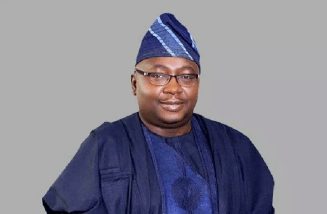The Federal Government has revealed that it is subsidising the provision of electricity with N2.93 trillion yearly but can no longer afford it.
It said this was one of the reasons it had to jerk electricity tariff for those who are on Band A supply from April 4, 2024.
The Minister of Power, Adebayo Adelabu, made this known at the ministerial press briefing series organised by the Ministry of Information and National Orientation on Friday in Abuja.
Adelabu however said the increment of tariff only affected 15 percent of electricity consumers who enjoy at least 20 hours of electricity, while the remaining 85 percent of consumers outside Band A would continue to enjoy subsidised power supply.

According to the minister, the increase in tariff would consequently reduce government subsidies from about N2.93 trillion to N1.5 trillion and free the cash for other investments in the electricity sector to improve generation, transmission and distribution.
He said the administration of President Bola Tinubu was concerned about the suffering Nigerians were going through and was therefore unwilling to remove all subsidies on electricity so as not to aggravate their plight.
Adelabu said: “We cannot remove 100 percent subsidy because of the suffering of Nigerians.
“We cannot allow our people to suffer.
“The rate is still cheaper than alternative sources of power like diesel and solar.”
The Minister said the Federal Government was putting in place a number of initiatives to improve the power sector.
He said that the Federal Government has put in place a presidential power initiative to ensure that power infrastructure were enhanced and improved across the sector.
Adelabu added: “There is also the Presidential Meter Initiative put in place to ensure that the meter gap is addressed.
“And we also have a lot of development banks that are working with us on several projects in transmission and distribution.
“So, as a ministry, we are committed to making an impact during this administration.”
Adelabu said the government was also ramping up generation companies, adding that a lot was being done in the transmission segment of the industry.
The Minister said that the government had invested in gas-to-power infrastructure and implemented policies to attract private investment, but regretted that many still don’t have power supply.
“Against this backdrop, the country began to explore more off-grid power sector solutions to address energy poverty and key into our Energy Transition Plan,” he said.
He said the government has projected renewable energy across the country, which was aimed at taking electricity supply to the rural communities and the underserved Nigerians.
He said the Federal Government had made significant efforts to provide the enabling environment to promote, attract and protect private sector participation and investment required to bridge the energy access gap.
According to Adelabu: “The Government has made Data Driven Decisions by collaborating with some experts to develop the Integrated Energy Planning Toolkit.
Also Read
- Tinubu congratulates AfDB President, Akinwunmi Adesina at 65
- Fasting: Hamzat, Yari, UNILAG VC lead dignitaries to UMA Pre- Ramadan lecture
- Lagos taskforce arrests, prosecutes 12 suspected land grabbers in Alausa
- Governor Adeleke engages 10,000 for Imole Youth Corps, says 250, 000 jobs created last two years
- Governor Okpebholo receives NULGE officials, assures of fruitful collaboration
“This innovative tool provides real-time data to pinpoint ideal locations for renewable energy projects streamlining investment decisions.
“We have developed legal frameworks that have liberalised the entire electricity value chain, integrated renewable energy.
“In addition, programmes being implemented by the Rural Electrification Agency have been successful in providing traditional and innovative financing opportunities for private sector driven interconnected and off grid project delivery.”


